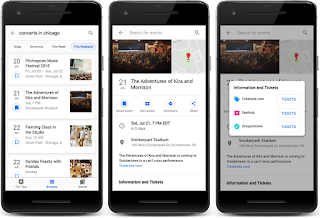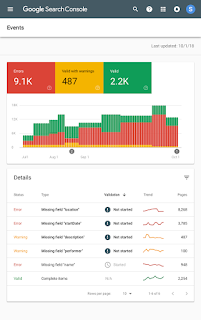2020 年 2 月 25 日,星期二
2020 年已正式拉开帷幕,人们开始为今年制定各种计划。如果您要举办任何类型的活动,可以通过 Google 上的活动搜索体验帮助用户发现您的活动。
要举办音乐会或研讨会?您启用活动标记后,当用户搜索“本周末的音乐会”或“我附近的研讨会”时,就会发现您的活动。用户还可能会在搜索活动场地(例如体育馆或当地酒吧)时发现您的活动。活动信息可以显示在指定场地的知识面板中,方便用户了解相应地点的情况。


以新的区域和语言发布
我们最近在德国和西班牙推出了活动搜索服务,至此 Google 上的活动搜索服务已覆盖全球九个国家/地区。如需查看可使用活动搜索服务的地点的完整列表,请参阅可用语言和区域列表。
如何让活动显示在 Google 搜索结果中
您可以通过以下三种方式使您的活动显示在 Google 上:
- 如果您使用第三方网站发布活动(例如,您在票务网站或社交平台上发布活动),请检查您的活动发布商是否已在参与 Google 的活动搜索服务。一种检查方法是搜索平台上显示的某个热门活动,看看是否显示了相应的活动信息。如果您的活动发布商已经与 Google 集成,则您可以继续在第三方网站上发布您的活动。
- 如果您使用 CMS(如 WordPress)且无权修改 HTML,请查看您的 CMS 是否有可向您的网站添加结构化数据的插件。或者,您也可以使用数据标注工具在不修改网站 HTML 的情况下向 Google 告知您的活动信息。
- 如果您有能力修改 HTML,可以使用结构化数据直接与 Google 集成。您将需要修改活动网页的 HTML。
遵循最佳做法
如果您已实现活动结构化数据,建议您查看结构化数据,以确保其符合我们的准则。具体而言,您应该:
- 请务必提供开发者指南中列出的必需属性和建议属性。
- 确保根据我们的准则定义提供高品质的活动详情。例如,使用说明字段来更详细地描述活动,而不是重复标题、日期、地点等属性或突出显示其他网站功能。
- 使用富媒体搜索结果测试工具测试和预览结构化数据。
监控您的网站在 Google 搜索中的表现
您可以通过 Search Console 查看用户与您的活动信息进行互动的效果:
- 在 Search Console 中使用效果报告查看搜索结果中的指定活动信息的活动详情视图数据。您可以使用 Search Console API 自动提取这些结果。
- 借助 Search Console 中的富媒体搜索结果状态报告,您可以了解 Google 能够或无法从您的网站读取哪些内容,并排查富媒体搜索结果错误。

如果您有任何问题,请访问网站站长中心帮助论坛。
